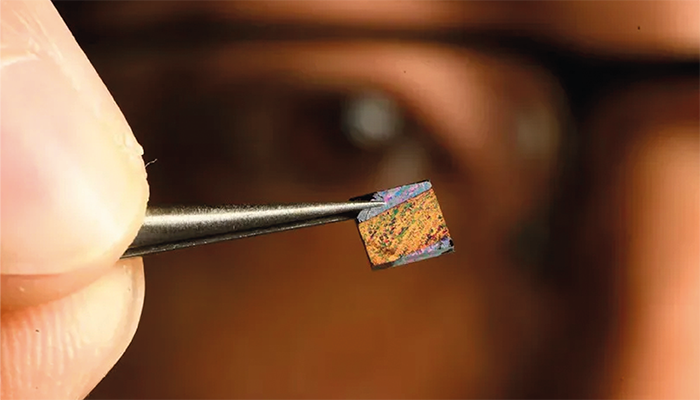
Johns Hopkins research Peng Zheng with the heart of the invention, a tiny chip with a groundbreaking nanostructured surface on which blood is tested.
Credit: Will Kirk/Johns Hopkins University
A new blood test can diagnose heart attacks in 5–7 minutes using a plasmonic metasurface and surface-enhanced Raman spectroscopy (SERS). Developed by researchers at Johns Hopkins University, the test is significantly faster than current methods, which can take hours, detecting key cardiac biomarkers that signal a heart attack – and hopefully improving the chances for timely medical intervention.
"Heart attacks require immediate medical intervention in order to improve patient outcomes, but while early diagnosis is critical, it can also be very challenging – and near impossible outside of a clinical setting," said Peng Zheng, assistant research scientist at Johns Hopkins University, in a press release. "We were able to invent a new technology that can quickly and accurately establish if someone is having a heart attack."
The heart of this invention is a metasurface-enhanced chip that amplifies the signals used in SERS to detect trace levels of biomarkers, such as creatine kinase-myocardial band (CK-MB), myoglobin (Mb), and cardiac troponin-I (cTnI). These proteins are crucial indicators of heart attacks, but traditional diagnostic tests can take an hour or longer to detect them.
By employing a nanostructured metasurface, the system boosts both electric and magnetic fields in Raman spectroscopy, improving the detection of these biomarkers in real time. The metasurface enables higher sensitivity to biomarker signals even at ultra-low concentrations.
"By using SERS with our metasurface technology, we can measure heart attack biomarkers in a matter of minutes," said senior author Ishan Barman, a bioengineer at Johns Hopkins.
The researchers demonstrated the technology's ability to simultaneously detect multiple biomarkers in small blood samples by tracking frequency shifts in the SERS signal, an approach that mitigates the signal fluctuations common in traditional intensity-based SERS methods. Each biomarker produced a distinct frequency shift, directly correlated with its concentration in the blood.
The platform's ability to provide accurate and fast results has potential applications beyond clinical settings. Barman notes that it could eventually be adapted for use by first responders in the field or even as a home-use diagnostic tool. "In the future, we hope this could be adapted into a hand-held device that could provide a diagnosis from just a drop of blood," added Barman.
The team is also exploring possibilities for adapting the system to detect biomarkers for other diseases, such as cancer and infectious diseases.
The next steps for the research team include refining the device further and expanding clinical trials to evaluate its performance across a wider range of patients and conditions.




